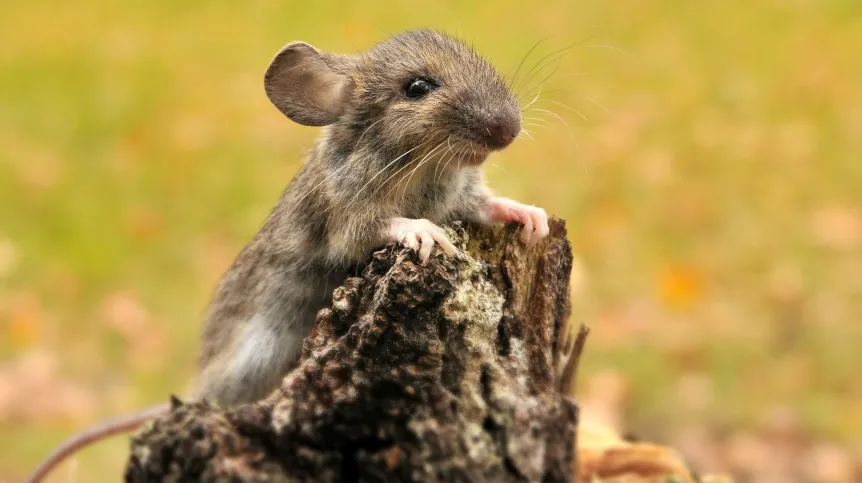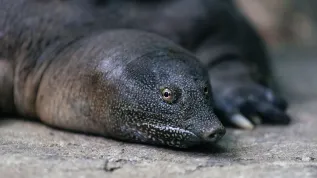
Pro-social behaviour is determined by sex, scientists from the Maj Institute of Pharmacology PAS found during their research on mice. In nature, these animals exhibit a number of social behaviours: they maintain a hierarchy, females nest together, and males display territoriality and aggression.
Pro-social behaviour (voluntary actions intended to benefit others) was previously considered a primarily human trait. In recent years, however, there have been more reports that - in variously designed experiments - animals often make pro-social choices. Researchers of the phenomenon talk about the evolutionary basis of such behaviour.
This was confirmed by new research by scientists from the May Institute of Pharmacology PAS in Krakow, who published their conclusions in Scientific Reports.
Doctoral candidate Klaudia Misiołek and a team of scientists from the institute observed the behaviour of adult mice that received a reward for entering one of the two compartments of the cage they lived in. By entering one of the compartments, mice could also provide a reward to their interaction partner - exhibit pro-social behaviour. The results of the study show that female mice chose the pro-social option more often than males, the authors of the study report in a press release sent to PAP - Science in Poland.
The researchers also tested the mice's sensitivity to social reward and their ability to recognize another's affective state, but found no significant differences between the sexes. However, they have confirmed that the sex of the mice has a significant impact on the propensity to make pro-social choices.
According to the researcher’s press release: ’This discovery suggests that pro-social behaviour is not exclusively human, and that similar mechanisms exist in the behaviour of other species. These results may be important for our understanding of the nature of pro-sociality and its evolutionary origins. Moreover, they open the door to research into new drugs in the treatment of psychiatric diseases that impair the adaptive social behaviour capability’.
When asked about the research assumptions related to the analysis of pro-social behaviour of mice, Misiołek says that this type of work at her institute began in 2017, when it was still not certain whether mice exhibited these behaviours, and whether there were sex differences in pro-social behaviour. 'Our first assumption was that mice - as a species that forms hierarchically organized social networks - would exhibit pro-social behaviour, i.e. voluntary behaviour that benefits other individuals - as proven in other species of laboratory animals', says Misiołek.
The first goal of the researchers was to develop a test cage and a test designed to study pro-social behaviour in mice. They modelled it on the pro-social choice task carried out on rats by Tobias Kalenscher's group in 2014 (doi: 10.3389/fnins.2014.00443). 'Our next assumption was that if we observe the occurrence of pro-social behaviour in mice, the neural mechanisms of these behaviours are probably evolutionarily preserved and common to all mammals, including humans', she says.
Citing previous research, she adds that in humans, one of the main factors influencing the tendency to exhibit pro-social behaviour is gender. 'So we thought it was crucial to study this aspect in mice', she says.
The researchers also assumed that, consistently with the reported higher propensity for pro-social behaviour in females, they would see female mice making more pro-social choices. And they did observe it.
'After observing sex differences in the propensity for pro-social behaviour, we wanted to understand what these differences might result from. We used the theory of the +camaraderie effect+, proposed by Lahvis in 2017 (doi: 10.1007/7854_2016_449), according to which the occurrence of pro-social is promoted by positive affect experienced by participants in social interaction, while positive affect is a direct result of empathy (the discrimination of the affective state of another individual) and enjoyment of social interaction (rewarding properties of social interaction). Our last assumption was that if we observed differences between in pro-social behaviour, these should be reflected in differences in the rewarding effects of social interaction and/or affective state discrimination. Hence, we conducted a place preference test, in which we examined sensitivity to the reward of being in a group, and an affective state discrimination test, in which we examined sensitivity to a changed emotional state of interaction partners', Misiołek says.
When asked about the types of pro-social behaviour mice might exhibit, the researcher explains that mice in the wild exhibit a range of social behaviours, such as female co-nesting, male territoriality and aggression, social memory, social hierarchies, and motivation to explore social stimuli.
Currently, in the case of pro-social behaviour, we see mice releasing their fellows from confinement (doi: 10.1038/s41598-019-42290-y) or taking actions to secure a tasty reward for another mouse (DOI: 10.1038/s41593-022-01179- 2, doi: 10.1038/s41598-023-32682-6). One of the most recent papers on this topic shows that familiarity with an individual influences the frequency of pro-social behaviour in mice, indicating increased pro-social decisions towards familiar individuals (DOI: 10.1038 /s41593-022-01179-2). The frequency of making pro-social decisions is most likely the resultant of many factors, including: degree of acquaintance, kinship, gender, social stimulus (smell of another individual, touch, sounds), status in the hierarchy, emotional state - this topic certainly requires further research', emphasises the researcher from the Institute of Pharmacology. of the Polish Academy of Sciences.
Pro-social behaviour is often studied in social species, especially primates that are closer to us in terms of evolution, but also in wolves and birds.
Misiołek explains that house mice were used in the experiments because they among the simplest species suitable for studying pro-social behaviour, and their nervous system resembles the human nervous system.
'Our experiments are basic research, but in a broader perspective, the intention is that the results could be used to develop hypotheses about the neural mechanisms of social behaviour in mammals, including humans. Social behaviour deficits occur in many mental disorders (schizophrenia, depression), neurodevelopmental disorders (autism spectrum disorders), neurodegenerative diseases and traumatic brain injuries. They hinder the formation and functioning in social relationships, significantly affecting the quality of life. In the future, a deeper understanding of the mechanisms underlying social behaviour (including pro-social behaviour) may contribute to the development of new pharmacological therapies for diseases associated with impaired adaptive social behaviour capability', she says.
PAP - Science in Poland
zan/ bar/ kap/
tr. RL













